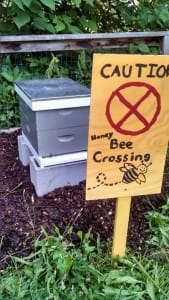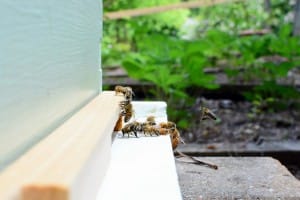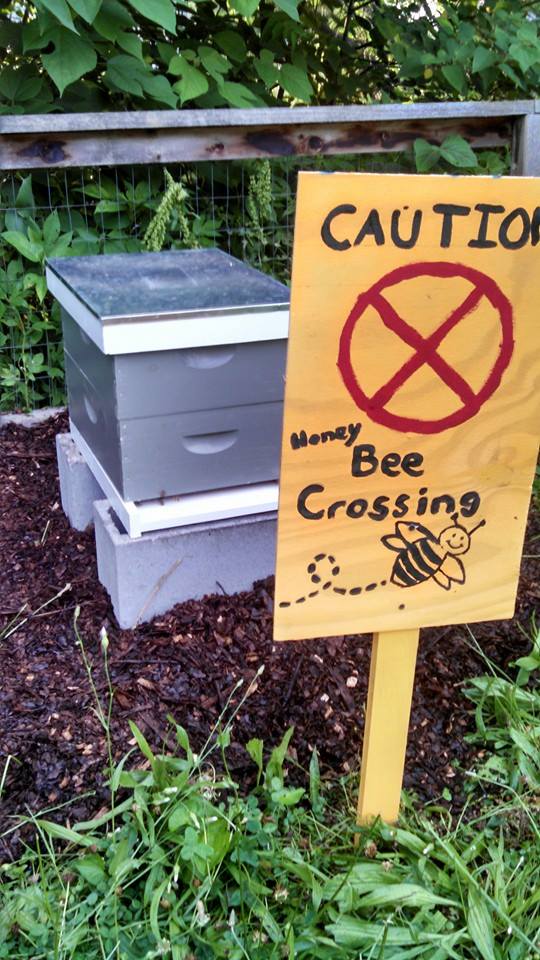
As people become increasingly aware of the importance of pollinators, more community gardens are considering establishing a honey bee hive (or three) of their own. Not only do bee-flower interactions increase garden productivity, bee hives can provide great educational opportunities for the communities that keep them.
By providing pollinator support to your garden, you are greatly increasing the chance that your crop yield will be heavier and of better quality than without bees. To give just one example of this, the Honey Bee Project of the University of Hawaii found that the addition of one hive to a hectare of cucumber plants can result in three times the fruit production as compared to a plot with no hives. Moreover, in terms of fruit development, they found that a minimum of eight to ten bee-flower interactions is necessary to produce a cucumber of adequate quality.
Bees provide crucial agricultural support to gardens, but they also afford us with important learning opportunities in regard to the ecology and interconnected nature of our food systems. The practice of keeping bees permits communities to learn about the living systems that provide food for us. Around one third of our global food production and 90 percent of wild plants are dependent on pollinator services. As bee populations decline due to Colony Collapse Disorder, rampant pesticide use, loss of habitat, pests and diseases, and genetic uniformity caused by selective breeding, the spreading of awareness is increasingly critical in our efforts to reverse the problem. The bees give us an opportunity to increase awareness of how to not only live sustainably within the system, but how to nurture it as well.
Now that we know how the establishment of bee hives in our community gardens can help us as gardeners, we need to ask ourselves how we can help the bees. Beekeeping is a fun, rewarding hobby, but taking upon the responsibility of caring for a colony of bees not a task to be taken lightly. Establishing beehives in your community garden requires either procuring a local beekeeper or becoming a beekeeper yourself in order to maintain the hives. Beekeeping associations often offer beekeeping courses in the early spring. Though these are not required to become a hobby beekeeper in Georgia, they are highly recommended for the benefit of the bees and the keepers.

In order to ensure a healthy, happy hive, take part in best management and good neighbor practices. It’s critical that your hive has a variety of non-pesticide-laced wildflowers to forage for food when crops are not in bloom. Strategically planting varieties of native wildflowers that bloom when crops are not blooming will provide season-long food supplies to keep your honey bees, as well as our critical native pollinators, healthy and productive. Plus they are pretty! It is also important that the bees have access to a clean nearby source of water; they need this to help produce food for baby bees as well as to cool their hives during the hot summer months. Keeping these necessities close by will discourage bees from traveling long distances and wasting energy that could be used to make honey, as well as from becoming a nuisance by spending too much time around your neighbor’s pool.
In regard to liability issues, there’s no guarantee a neighbor or visitor won’t bring a nuisance or negligence case against you regardless of the precautions you’ve taken. As Georgia has no laws protecting beekeepers from these legal actions, this topic is open for legal interpretation. However, the liability risk is negligible in comparison to the great ecological benefits that these insects provide. Moreover, honey bees are an extremely docile species of bee and the likelihood of being stung is extremely low, especially when they are not in their hive. Unfortunately, many people mistakenly believe they have been stung by a honey bee when in fact they were stung by a yellow jacket or other aggressive stinging insect. Considering that the act of stinging causes the bee to die, this action is only taken as a last resort when defending their colony. Some beekeepers claim that honey bees are so docile that, when foraging for food in flowers, they can even be pet. Keith Delaplane, a UGA entomologist has a thorough publication, Honey Bees and Beekeeping. Helpful information on all types of bees can also be found through the Xerces Society.
If you’re interested in establishing a bee hive in your community garden, you can learn more by visiting local beekeepers, taking some beekeeping classes, or by contacting your local UGA Extension office.
Jennifer Grimes is a City and Regional Planning Graduate Student at Georgia Tech. She is currently an intern with the Georgia Tech Urban Honey Bee Project. Jennifer is also a home brewer and plans on making mead in the near future using local honey – Honey Bee-r!
Happy beekeeping!
- ParSLAY the Day! - June 12, 2024
- 6th Annual Great Southeast Pollinator Census - May 28, 2024
- Are you ready for Pepper Palooza? - July 5, 2023
